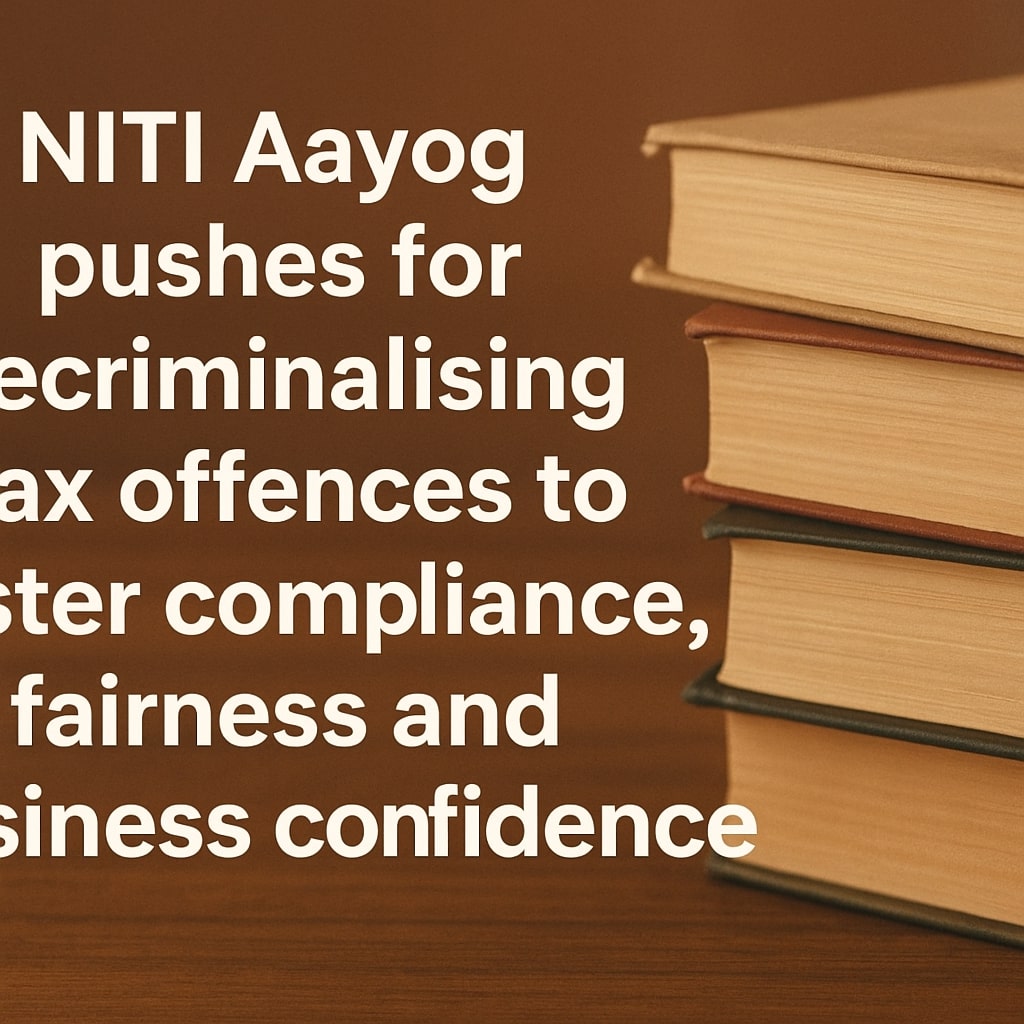
NITI Aayog has called for decriminalising several minor offences under the new Income-tax Act, 2025, in a move to shift India’s tax system from a punitive, fear-driven approach to one based on trust, fairness, and voluntary compliance.
The think tank’s working paper recommends keeping criminal penalties only for serious offences such as fraud or deliberate evasion, while procedural or technical lapses—like non-filing of returns or failure to produce documents—should be handled through civil or administrative measures.
The working paper, titled “Towards India’s Tax Transformation: Decriminalisation and Trust-Based Governance,” evaluates the criminal provisions embedded in the new income tax law and recommends a calibrated reduction in the use of criminal sanctions. It stresses that criminal law must be a “measure of last resort”, reserved only for cases of fraud, wilful evasion, and deliberate obstruction, not for procedural or technical lapses.
“Criminal sanctions, when indiscriminately imposed, stimulate a climate of fear and inhibit genuine entrepreneurial activity, while also overburdening the judicial apparatus with matters better addressed through civil or administrative remedies,” an tax expert said.
Mapping the criminal landscape under the new tax law
NITI Aayog’s analysis shows that the old Income-tax Act of 1961 had 54 criminal offences under 15 provisions, many of which were for technical or procedural lapses. The new Income-tax Act, 2025, reduces this to 35 offences across 13 provisions.
The think tank has recommended decriminalising 12 of these, such as not filing returns, failing to produce documents, or not cooperating during digital inspections, and handling them through civil or administrative action instead.
However, it suggests retaining criminal penalties for six serious offences like falsifying accounts, abetting false returns, obstructing enforcement, and fraudulently transferring property to avoid tax recovery.
The approach, he said, demonstrates a well-researched attempt to “align the new income tax laws with contemporary economic realities and principles of taxpayer fairness.”
Principles behind the reform
The working paper develops a principle-based criminal law framework for tax policy, drawing on comparative global practices and legal jurisprudence.
It rests on five key tenets:
Protection of fundamental societal values: Criminal law should be applied only when core values such as fiscal integrity and rule of law are at risk.
Direct and substantial harm: Procedural lapses that do not cause material harm should not invite criminal sanction.
Subsidiarity: Civil or administrative measures should be the first line of enforcement.
Proportionality: Punishment must match the gravity of the wrongdoing.
Precision and periodic review: Offences should be narrowly drafted and revisited periodically to remove obsolete or redundant provisions.
Concerns over overcriminalisation and judicial burden
The report says India’s tax system remains weighed down by overcriminalisation, with jail terms imposed even for minor mistakes that could be handled with fines. For example, taxpayers can face imprisonment for not assisting during digital inspections or for filing returns late — even when there’s no intent to cheat.
It also flags legal provisions that presume guilt and force the accused to prove innocence, calling them unfair and contrary to basic legal principles. Mandatory minimum sentences, limited judicial discretion, and a lack of transparency in how offences are compounded only make things worse.
NITI Aayog warns that such excessive criminalisation clogs courts and fuels taxpayer anxiety, as many prosecutions stem from procedural lapses rather than deliberate tax evasion.
Decriminalisation as a trust-building measure
The policy think tank’s recommendations are in sync with the government’s broader reform drive under the Jan Vishwas (Amendment of Provisions) Bill, 2025, which seeks to decriminalise minor and technical violations across economic laws.
“The government’s recent initiatives reflect a strategic endeavour to enhance the ease of doing business by reclassifying minor, non-malicious violations as civil infractions rather than criminal offences,” he observed.
Experts believe that these reforms, if adopted, will help restore taxpayer confidence, encourage voluntary compliance, and reduce litigation, while still preserving criminal prosecution for deliberate fraud or evasion.
A step towards predictable tax governance
NITI Aayog’s proposals are expected to shape future discussions around the new Direct Tax Code, potentially setting a precedent for how India balances enforcement with economic pragmatism. The report also calls for abolishing mandatory minimum imprisonment, introducing alternative sanctions like fines and community service, and ensuring regular legislative review to weed out obsolete provisions.
Ultimately, the move represents a shift in mindset — from a punitive approach rooted in distrust to one that encourages transparency, self-compliance, and fairness. By focusing criminal prosecution on truly egregious conduct while rationalising the rest, the paper lays the groundwork for a tax system that is simpler, fairer, and more aligned with a modern economy.